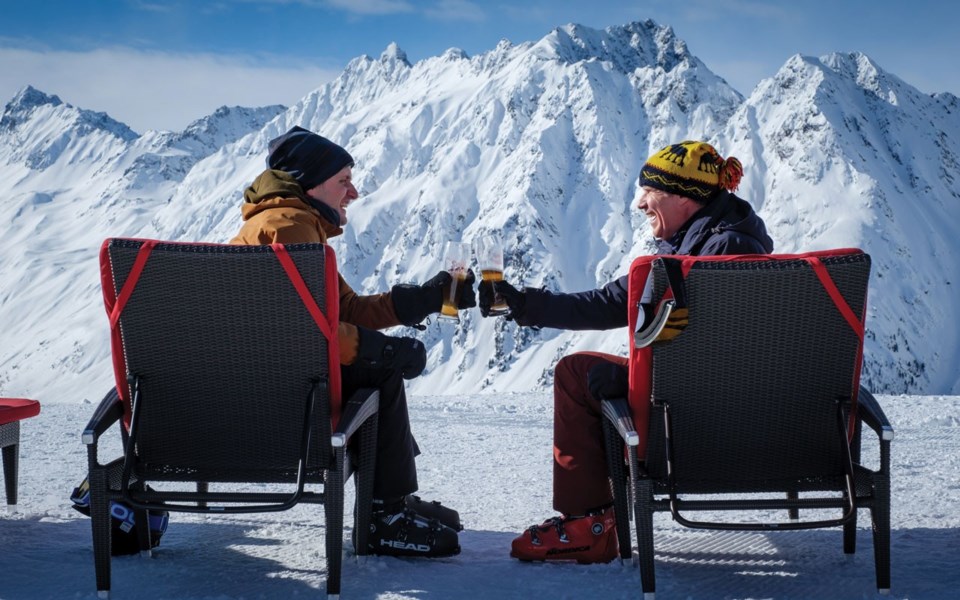From the early days of the artform, cinema has always had a boner for skiing.
In 1910, French actor Max Linder starred in Max Goes Skiing, a flick where, much like Snakes on a Plane, the title is the plot. By the 1920s and '30s, there were a bunch of popular ski-centric silent movies with titles such as Avalanche (1923), Love on Skis (1928), The Great Leap (1927).
By the 1960s, skiing had infiltrated the action genre, peaking with James Bond and some pretty decent machine-gun cliff drops and some gnarly one-footing action in 1969's On Her Majesty's Secret Service. (Bond would revisit the sport, with slightly better shredding—including a switch back-half off a cornice and a legit ski BASE jump—for the opening scene of 1977's The Spy Who Loved Me).
By the '80s and '90s, skiing entered its best cinematic era with sexed up comedies like Hot Dog, Ski Patrol, and Ski School. Sadly, that was the high-water mark for the sport, and aside from 2010's Hot Tub Time Machine, it's been mostly downhill from there.
Literal case in point: Downhill, a skiing family dramedy starring Will Ferrell as a family man who ditches his family in the face of what appears to be a dangerous avalanche, opens this week. Once the snow-dust settles and he learns everyone is OK, Ferrell has to face his true colours, and worse, his wife—played by Julia Louis-Dreyfus.
Based on a 2014 Swedish comedy called Force Majeure, Downhill relies heavily on the wit and charm of Dreyfus but the tone is a bit forced and Ferrell once again reveals his range is limited. Still, I guess if Marriage Story proved anything it's that people will watch a relationship go down the toilet; at least Downhill does it on a ski hill.
Speaking of Snakes on a Plane, it's Black History Month and while tiny incremental gains are being made for minorities in Hollywood (f*ck yeah Bong Joon Ho) it's definitely worth taking a look back at some of the iconic black actors and directors that really carried the torch in Tinseltown the past 40 years.
This week, we'll kick things off with actor Laurence Fishburne. He was just 14 years old when he started filming Apocalypse Now with Francis Ford Coppola, smoothly stepping into a supporting role that drove home the idea that America was literally sending its children to die in the jungle. After kicking around the TV/B-movie scene for the next decade (Death Wish II, Nightmare on Elm Street 3, Red Heat and of course as "Cowboy Curtis" on Pee-Wee's Playhouse), Fishburne basically invented the hip-hop, street-gangsta archetype in 1990 with Abel Ferrara's King of New York (incredible flick).
From there he upped the game, playing the OG dad in Boyz n the Hood, co-starring with Jeff Goldblum in Deep Cover, and then earning an Oscar nom for his take on Ike Turner in 1993's What's Love Got to Do With It? But for Fish, the big time came calling in 1999, as he played Morpheus to Keanu Reeve's Neo and set off one of the most successful sci-fi franchises ever, The Matrix. He continues to act, write, direct and perform on the stage.
On the directing side, Spike Lee is the icon but let's pour some on the block for John Singleton. Born and raised in south L.A., Singleton was one year out of USC film school when he wrote and directed Boyz n the Hood. Besides launching Ice Cube's film career (as well as Cuba Gooding Jr. and Nia Long), the flick earned Singleton—just 24 years old at the time—a Best Director Oscar nomination, the first African-American and youngest person to ever be nominated (Jonathan Demme ended up winning for Silence of the Lambs).
Singleton continued to make films that spoke to and shared the culture of urban and black audiences (Poetic Justice, Higher Learning, Baby Boy, and the historical drama Rosewood) before shifting to action and TV projects. Singleton died of a stroke last April, but he will be remembered for bringing the black experience to the world at a time when few were given the opportunity to do so.




